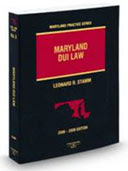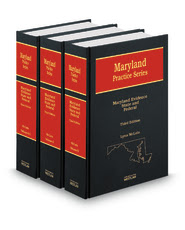I recently handled a sentencing for a client of mine for driving while impaired (DWI). Under Maryland law, one year of ignition interlock is required if you are convicted of the higher offense, driving while under the influence of alcohol (DUI). However, the relevant statutes do not require it for DWI, unless the “trier of fact finds beyond a reasonable doubt that the person refused to take a test arising out of the same circumstances as the violation.” More often than not, in Maryland, a driver who refuses a breathalyzer test at the time of arrest if found guilty of anything, will not be found guilty of the higher offense DUI, only the lower DWI. So the question is what does this phrase mean, that the “trier of fact finds beyond a reasonable doubt that the person refused to take a test arising out of the same circumstances as the violation.”
The answer can be found in Wadlow v. State, 335 Md. 122, 642 A.2d 213 (1994). In Wadlow, the indictment charged the defendant with possession with intent to distribute more than 448 grams of cocaine but it did not refer to the sentencing enhancement under Art. 27, § 286 (f). Also, the jury was never asked to decide the amount of cocaine. As a result the Maryland Supreme Court reversed the part of the sentence that relied on possession of more than 448 grams. The Court said:
In Maryland, however, we have generally drawn a distinction between sentence enhancement provisions that depend upon prior conduct of the offender and those that depend upon the circumstances of the offense. In the former situation, involving recidivism, we have made it clear that determination of the requisite predicate facts is for the sentencing judge. See Maryland Rule 4–245(e) (“[T]he court shall determine whether the defendant is a subsequent offender….”). The State must give timely notice to the defendant of its intention to seek enhanced penalties because of one or more prior convictions, but that notice is not filed with the court until after the acceptance of a guilty or nolo contendere plea, or after conviction. The applicable Rule also provides that “[t]he allegation that the defendant is a subsequent offender is not an issue in the trial on the charging document….” Md.Rule 4–245(d).
In the latter case, however, where the legislature has prescribed different sentences for the same offense, depending upon a particular circumstance of the offense, we have held that the presence of that circumstance must be alleged in the charging document, and must be determined by the trier of fact applying the reasonable doubt standard.
Wadlow v. State, 335 Md. 122, 128–29, 642 A.2d 213, 216 (1994)(footnotes omitted)(emphasis supplied). Wadlow is still valid and has been followed in many other cases. E.g., Fisher v. State, 367 Md. 218, 786 A.2d 706 (2001)(sentencing enhancement reversed); Parker v. State, 185 Md. App. 399, 419, 970 A.2d 968, 980 (2009)(sentencing enhancement reversed).
In the vast majority of DWI cases, the Wadlow ruling requires the Court to not require the ignition interlock. The DWI charge to date almost never includes an allegation that the Defendant refused. Transp. § 21-902 (b) allows imposition of a sentence of two months and/or a fine of $500. Transp. § 21-902.3 creates an additional penalty of one year ignition interlock, requiring a finding beyond a reasonable doubt that the Defendant refused to submit to a chemical test. Refusal is not an element of driving while impaired. In order for a court to have found the Defendant guilty, it is not required to find beyond a reasonable doubt that he refused. The refusal is a “circumstance of the offense” not alleged in the charging document and not necessary to a finding of guilt. Therefore, in most cases a Defendant found guilty of DWI is not eligible for a mandatory interlock enhancement.
Keep in mind though, that a judge still has discretion to impose interlock in an appropriate DWI case. My point in this blog is that it is almost never required for a DWI.
Leonard R. Stamm
Goldstein & Stamm, P.A.
6301 Ivy Lane, Suite 504
Greenbelt, MD 20770
301-345-0122
(fax) 301-441-4652
www.lstamm.com
http://www.marylandduilawyer-blog.com
stamm.lenny@gmail.com
Fellow, National College for DUI Defense
Dean, Maryland Criminal Defense Attorneys’ Association
Author: West’s Maryland DUI Law

Author: post 2013 updates to Maryland Evidence: State and Federal by Professor Lynn McLain
“Patience, Perseverance, Persuasion”
 Maryland DUI Lawyer Blog
Maryland DUI Lawyer Blog


